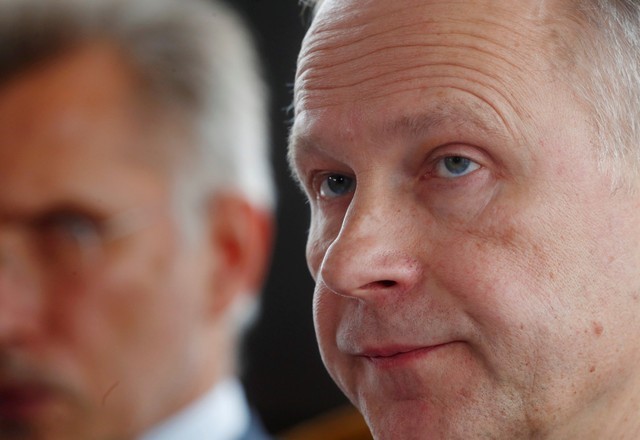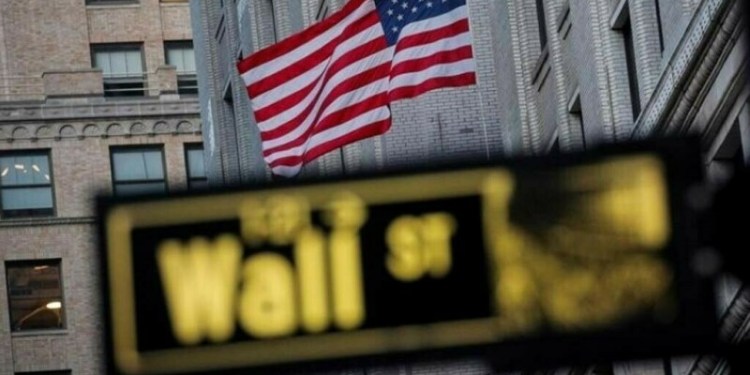 © Reuters. FILE PHOTO: Latvian central bank governor Rimsevics listens during a news conference in Riga
© Reuters. FILE PHOTO: Latvian central bank governor Rimsevics listens during a news conference in RigaBy Gederts Gelzis and John O’Donnell
RIGA/FRANKFURT (Reuters) – Latvia’s public prosecutor accused its central bank chief on Friday of accepting the offer of a 500,000-euro ($582,000) bribe, in a case that has rocked faith in the Baltic state and cast a cloud over the euro currency bloc.
The announcement of detailed charges paves the way for the trial of Ilmars Rimsevics, one of Europe’s most influential economic policymakers, who led the former Soviet country into the euro.
Rimsevics was briefly detained earlier this year and has since protested his innocence, dismissing the accusations as a smear campaign and rejecting repeated calls from politicians to resign.
The case, coupled with the closure of Latvia’s third-largest bank, ABLV, after the United States accused it of money-laundering, has damaged the reputation of the Baltic state, which fashioned itself as a financial bridge between Russia and the west.
It has also tarnished the image of the European Central Bank (ECB), where Rimsevics helped set monetary policy for the entire euro currency bloc as a member of its governing council. The ECB was also responsible for monitoring ABLV, the bank that closed.
Viorika Jirgena, a Latvian state prosecutor, told journalists that the bribes had been paid by two shareholders of Trasta Komercbanka at a time when the Latvian bank was worried about its future.
FREE HOLIDAY
She said the bribery dated back to 2010, when the shareholders paid for Rimsevics to spend a vacation in Kamchatka, a wilderness region in Russia’s far east.
In return, Jirgena said Rimsevics helped them prepare answers to questions from the Latvian regulator, the Financial and Capital Market Commission (FCMC).
Later, in 2012, the shareholders agreed to pay him 500,000 euros in two equal installments, in return for Rimsevics using his influence to soften the Latvian agency’s treatment of the bank.
“They agreed amongst themselves that the bribe would be paid in two parts,” said Jirgena. “One half was to be paid in advance of the decision (by the Latvian regulator) and the second half afterwards.”
As central bank governor, Rimsevics was entitled to attend meetings at the FCMC regulator and was also responsible, along with the finance ministry, for proposing its head.
Rimsevics was, however, unsuccessful in preventing Trasta Komercbanka’s demise. As a result, the shareholders refused to pay Rimsevics the second 250,000-euro installment.
The bank closed in 2016 after the Latvian regulator said it had broken money-laundering rules.
“They hoped that … Trasta Komercbanka could continue in business,” she said. “But things didn’t go to plan. So the bribers refused to pay the rest of the bribe.”
Earlier this year, those shareholders approached Latvian anti-corruption investigators, handing over evidence of the bribery on the understanding that they would not be prosecuted.
GATEWAY TO WEST
A spokeswoman for the FCMC said she could not disclose who at the regulator was involved in taking decisions about the bank but that there had been no way for the central bank governor to influence the outcome.
“The FCMC performs its work as an autonomous public institution and adopts its decisions independently,” she said. Rimsevics did not respond to requests for comment on Friday.
Trasta Kommercbanka’s administrators did not respond to a request for comment.
The European Central Bank has accused Latvia in Europe’s highest court of illegally removing Rimsevics from his post as governor and asked for at least some of his powers to be reinstated, so as not to hold up the ECB’s decision-making.
Since securing independence from Russia in 1991, more than a dozen Latvian banks have promoted themselves as a gateway to Western markets for clients in Russia and other former Soviet states – and promised Swiss-style secrecy for clients.
Trasta Kommercbanka had been one of that group.
At the peak in 2015, Latvian banks held deposits of about 12 billion euros ($15 billion) for foreign customers. Bankers and officials have said much of the money came from Russia.
Changing its approach to banking presents Latvia with a difficult balancing act.
Washington is an important military ally for the former Soviet-ruled state of 2 million people on the EU’s eastern flank. It also has close historical and trade ties with Russia.
Source: Investing.com





























